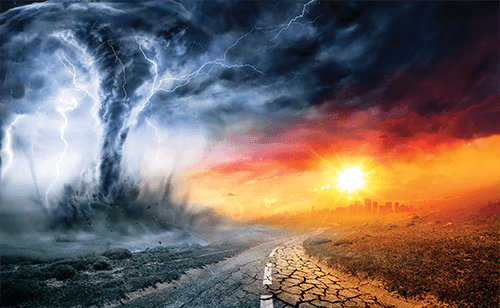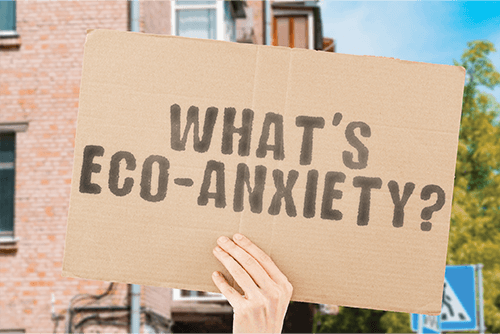Studies show that climate change has adverse effects on mental health, especially among the young and vulnerable
The climate of our planet is changing at an unprecedented and alarming rate, and these changes are already profoundly impacting human health. The World Health Organization estimates that between 2030 and 2050, we will see an increase of 250,000 excess deaths per year due to the effects of climate change [1].
The impacts of climate change on humans, however, go beyond physical health. Though they are less studied, the risks and impacts of climate change on mental health are becoming more evident, resulting in a range of direct and indirect consequences that disproportionately affect those who are most marginalized.
Dangers of extreme weather
Climate change is already increasing the intensity and frequency of severe weather and other natural disasters, such as hurricanes, wildfires, floods, and droughts. Individuals who experience these disasters directly can suffer a range of impacts on mental health (Figure 1). These may include posttraumatic stress disorder, depression, anxiety, complicated grief, substance abuse, and suicidal ideation. One study found that following Hurricane Katrina in 2005, an estimated 20%–35% of survivors experienced some form of mental health issue [1]. At the community level, such disasters can strain social relationships, reduce social cohesion, and increase interpersonal violence and child abuse [2].

Figure 1. Climate change has real impacts on mental health including post-traumatic stress disorder, depression, anxiety, complicated grief, substance abuse, and suicidal ideation. (Image courtesy of iStockphoto/RomoloTavani.)
Additionally, air pollution from burning fossil fuels has been linked to an increased risk of anxiety, depression, and other mental health issues. For instance, one study reported that children were more likely to visit the emergency room for mental health problems on days with higher levels of pollution [3].
Research also indicates that rising temperatures can exacerbate mood and anxiety disorders, schizophrenia, and vascular dementia [2]. Increasing temperatures may contribute to people behaving more irritably, aggressively, and even violently, resulting in increases in emergency room usage and suicide rates [4]. “We have done a systematic review and meta-analysis showing that for a day that is hotter by 1 °C, there is a 1% increase in deaths by suicide,” says Emma Lawrance, the mental health innovations fellow at the Institute of Global Health Innovation at Imperial College London (Figure 2). “With extreme heat, we see more hospitalizations and presentations of mental illness symptoms, as well as worsened community and population mental health, including less restful sleep and more negative and fewer positive emotions.”

Figure 2. Emma Lawrance is the mental health innovations fellow at the Institute of Global Health Innovation at Imperial College London. (Photo courtesy of Lawrance.)
Indirect impacts of climate change
There are also significant mental health impacts from the social, economic, and environmental disruptions related to a changing climate. Changes in climate affect agriculture, infrastructure, and livability, all of which contribute to quality of life. Long-term impacts of climate change may include food and water shortages, loss of employment and social support, conflict, and population displacement and migration [5].
“What we call the social-economic-environmental determinants of mental health and well-being—factors like community, clean air, healthy food systems, safe water, connection to nature, and access to education and employment—are all at risk due to climate change,” says Lawrance. “The climate crisis is destabilizing the things we know people need to be healthy and well.”
Even in areas of the world less directly touched by natural disasters and severe weather, people may suffer the mental health consequences of climate change. Watching or reading about climate hazards on the news or hearing from people you know who are experiencing extreme weather can lead to feelings of fear, anger, loss, helplessness, and sadness (Figure 3). The concern about climate change and the existential threat it poses is often referred to as “eco-anxiety” or “climate anxiety” [2].

Figure 3. Becoming more prevalent among young adults, concern about climate change and the existential threat it poses is often referred to as “eco-anxiety” or “climate anxiety.” (Image courtesy of iStockphoto/Andrii Koval.)
Worry and negative emotions related to environmental changes are extremely common, with majorities in nearly every country around the world describing some concern about the issue. However, in some people, the level of climate anxiety they feel begins to affect their ability to sleep, concentrate, or enjoy themselves. “This is less common, but last spring 45% of young people in a global survey said that their worries about climate change at least sometimes affected their ability to function,” says Susan Clayton, a psychologist at the College of Wooster (Figure 4).

Figure 4. Susan Clayton is a psychologist at the College of Wooster. (Photo courtesy of Lisette Winkler.)
Who is at risk?
Research shows it is the most marginalized who are especially vulnerable to the mental health impacts of a changing climate. These same populations often lack the financial, social, or community resilience needed to adapt and recover from climate hazards [1]. “Climate change is a threat multiplier,” says Katie Hayes, senior policy analyst for Health Canada (Figure 5). “It exacerbates existing inequalities in society.”

Figure 5. Katie Hayes is a senior policy analyst for Health Canada. (Photo courtesy of Health Canada.)
Residents of low- and middle-income countries are one group at higher risk of mental health consequences of climate change. In addition to an increased exposure to climate hazards, people in these countries may also experience high levels of poverty and lack of access to services [4]. “There is a huge injustice across countries in that the ones feeling the effects of climate change most are often the ones with the least current and historical emissions and which have contributed the least to the problem,” says Lawrance.
“The same is true across generations, with children shouldering a huge burden of the mental and physical health impacts of climate change,” she adds. Children are vulnerable in part because their bodies, nervous systems, and emotional regulation abilities are still developing. Stress and trauma at an early age, such as that experienced during a natural disaster, can have lifelong mental health consequences.
Individuals with preexisting mental health conditions are vulnerable to the effects of severe weather, especially excessive heat. Some psychiatric medications can interfere with a person’s ability to regulate heat and their awareness that their body temperature is rising [5]. Heat waves are known to contribute to higher rates of hospitalizations and deaths among individuals with mental health conditions, especially those with dementia, schizophrenia, and substance use disorders [4].
Communities that are already disadvantaged by historic and current social, economic, and political oppression are also more likely to feel the effects of climate change. For instance, people with lower socioeconomic status are more likely to live in risk-prone areas and have less access to health care after a disaster. Certain disadvantaged communities, such as indigenous communities and other groups dependent on the natural environment, can experience disproportionate mental health impacts [2].
There are also risks to people in certain occupations, including those who study or work on climate change issues, those who work on the land or water, and first responders and emergency workers who are responding to climate-related disasters. Women, the elderly, and chronically ill people may also be more prone to mental health challenges from a changing climate [5].
Responding to the climate crisis
Awareness of the mental health issues associated with climate change is growing, and some nations and organizations are responding to these challenges. In Canada, Hayes led the writing of a dedicated chapter on mental health and climate change in a national assessment published in February 2022 titled “Health of Canadians in a Changing Climate.” The chapter provides the latest evidence of the risks, identifies those who are most susceptible, and outlines adaptation opportunities and case stories of how to address climate change and mental health.
Hayes also cites Health Canada’s Wellness Together platform, initiated in the wake of the COVID-19 pandemic to open up access to mental health care. “It is freely available mental health care for anyone, available 24 hours a day, seven days a week, in both English and French, and with live interpretation for over 200 other languages,” she says. “It’s open to any kind of mental health concern, including climate anxiety and dealing with climate hazards.”
At Imperial College London, Lawrance leads the Climate Cares Program, an initiative of the Institute of Global Health Innovation and the Grantham Institute of Climate Change and the Environment. “We are both trying to understand more about this topic and also summarize the evidence to date to make various communities and sectors aware of the problem,” she says. “This includes speaking to policy makers, health system leaders, mental health professionals, and teachers, as well as working to develop interventions that can be part of making change.”
Nongovernmental organizations are also stepping up to help people dealing with climate anxiety or other impacts of climate change. Online platforms, such as Eco-Anxious Stories, and newsletters, such as Gen Dread, are places where people can discuss their own feelings as well as the latest research and actions that can be taken. “Over the last decade or so the topic area has grown quite a bit but also the support mechanisms and actions to address it have evolved as well,” says Hayes.
Clayton co-authored a recent report from the American Psychological Association and ecoAmerica titled “Mental Health and Our Changing Climate: Impacts, Inequities, and Responses.” In the report, she and her colleagues emphasize the need for governments to address the root of the problem [2]. After all, the stress people are experiencing is not just from the fact that the climate is changing; it is also because of the perceived inaction by leaders to do anything about it.
“Part of the problem is that people do not trust those in charge to take effective action,” she says. “So evidence that governments, at any level, are taking the problem of climate change seriously and taking actions to address the impacts could, by itself, help to reduce climate anxiety.”
Individual actions for mental wellness
The report co-authored by Clayton also suggests actions individuals can take to mitigate the mental health impacts of climate change. “We all need to find ways to build resilience without engaging in denial,” she says. “This can include taking time off from following the news, making time for positive experiences, practicing mindfulness techniques, and connecting with other people.”
Hayes agrees, adding that there is no one-size-fits-all approach to mental health. “There are a variety of actions that people may take to support their well-being. It could be seeking mental health care or engaging in community, family, or social support systems. For some, activism and finding ways to mitigate or adapt to climate change can provide a sense of community and efficacy.”
Additionally, research shows that the same actions we take as individuals to curb climate change also have immediate health benefits. Many pro-environment lifestyle changes, including eating more plants, engaging in active transport like biking or walking, and spending time in green spaces, also have positive impacts on physical and mental health.
Finally, there is the importance of hope. Individuals can respond to the current crisis by working to create systems and a culture that support people and the planet, says Lawrance. “It’s okay to feel that grief and rage about what we are losing and our fears for the future,” she says. “At the same time, no matter where we are at, there is always a better and a worse path forward. We can be part of working to create hope through our actions to push toward that better future that we want to see.”
References
- K. Hayes et al., “Climate change and mental health: Risks, impacts and priority actions,” Int. J. Mental Health Syst., vol. 12, p. 28, Jun. 2018, doi: 10.1186/s13033-018-0210-6.
- S. Clayton et al., “Mental health and our changing climate: Impacts, inequities, responses,” Amer. Psychol. Assoc. ecoAmer., Washington,
DC, USA, 2021. - Climate Change and Mental Health, Harvard T.H. Chan School Public Health, Boston, MA, USA. [Online]. Available: https://www.hsph.harvard.edu/
c-change/subtopics/climate-change-and-mental-health/ - L. A. Palinkas and M. Wong, “Global climate change and mental health,” Current Opinion Psychol., vol. 32, pp. 12–16, Apr. 2020, doi: 10.1016/j.copsyc.2019.06.023.
- How Extreme Weather Events Affect Mental Health, Amer. Psychiatric Assoc., Arlington, VA, USA, 2019.



